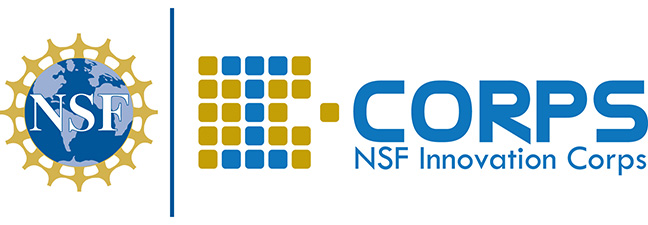NSF I-Corps Teams Program to Support NSF-Funded Projects

The National Science Foundation (NSF) seeks to develop and nurture a national innovation ecosystem that builds upon fundamental research to guide the output of scientific discoveries closer to the development of technologies, products and processes that benefit society.
In order to jumpstart a national innovation ecosystem, NSF has established the NSF Innovation Corps Teams Program (NSF I-Corps Teams). The NSF I-Corps Teams purpose is to identify NSF-funded researchers who will receive additional support – in the form of mentoring and funding – to accelerate innovation that can attract subsequent third-party funding.
The purpose of the NSF I-Corps Teams grant is to give the project team access to resources to help determine the readiness to transition technology developed by previously-funded or currently-funded NSF projects. The outcomes of I-Corps Teams projects will be threefold: 1) a clear go or no go decision regarding viability of products and services, 2) should the decision be to move the effort forward, a transition plan for those projects to move forward, and 3) a technology demonstration for potential partners.
Teams does not fund research. It provides additional support in the form of entrepreneurial mentoring and funding ($50K) to potentially accelerate your tech-transfer and help you explore commercialization of research outcomes.
I-Corps Teams Eligibility:
- The award that you were affiliated with would make you eligible for I-Corps Teams, should be current or should not have expired more than five years ago.
- The I-Corps “grantee” designation for an award extends to the PI, Co-PIs, Senior Personnel, Post-Docs, Professional Staff or others – provided you were named or supported under an award. Example: If you were a Post Doc supported by a grant you are eligible to pursue I-Corps Teams funding.
- The current or prior award could range from a modest single-investigator award to participation in a large, distributed center and also includes awards involving students such as REU Sites or Graduate Research Fellowships.
To date, NSF’s I-Corps Teams Program has supported more than 800 Teams – of those, many are now engaged in startups as a result of their I-Corps experience.
To find out more about NSF’s I-Corps Teams Program, join our Webinar on:
Tuesday, January 3, 2017 at 2:00 P.M. (EST)
[button link=”https://nsf.webex.com/mw3100/mywebex/default.do?service=1&siteurl=nsf&nomenu=true&main_url=%2Fmc3100%2Fe.do%3Fsiteurl%3Dnsf%26AT%3DMI%26EventID%3D426209827%26UID%3D501042457%26Host%3DQUhTSwAAAAJZh91kz47lrPJ2IFkbD8V4DUr9l18uJzxEu27fyJNkdDLpzqUbi2dQHKI4cBSQSKDAkYo8hERFnCX8wmEvUHYA0%26FrameSet%3D2%26MTID%3Dm37c931eeb5d7a1c32e62c41975c03a2b” target=”new” color=”default”]Webinar Link[/button]
- Meeting number: 746 732 125
- Meeting Password: I_C0rp5!
To hear audio, dial:1-800-857-5210 (phone connection) toll free code: 3192939
Following entry of your code, please provide the required detail when prompted.
How To Pursue Support:
1. Form your team (see below).
- Prepare a one-page Executive Summarythat describes the following:
- Composition and roles (EL, PI, Mentor) of the team members proposing to undertake the commercialization feasibility research:
- The Entrepreneurial Lead (EL) could be a Post -Doctoral scholar, graduate or other student, or other person with relevant knowledge of the technology and a deep commitment toinvestigate the commercial landscape surrounding the innovation. The Entrepreneurial Leadshould also be capable and have the will to support the transition of the technology, shouldthe I-Corps project demonstrate the potential for commercial viability.
- The I-Corps Mentor will typically be an experienced entrepreneur with proximity to theinstitution and experience in transitioning technology out of Academic labs. The I-Corps Mentor must be a third-party resource and may be recommended by the proposinginstitution. The I-Corps Mentor will be responsible for guiding the team forward and trackingprogress through regular communication with the Cognizant NSF I-Corps program director.
- The Principal Investigator (PI) will be responsible for overall grant management.
- Relevant current/previous NSF awards (i.e., I-Corps idea lineage)
- Brief description of the potential commercial impact
- Brief description of the current commercialization plan
- Send the Executive Summary to Steve Konsek, Program Director: skonsek@nsf.gov
Once your Executive Summary is reviewed, you will be contacted about next steps.
To find out more about I-Corps refer to:
 National Science Foundation RII Track-1 Project:Expanding Research, Education and Innovation in South Dakota
National Science Foundation RII Track-1 Project:Expanding Research, Education and Innovation in South Dakota